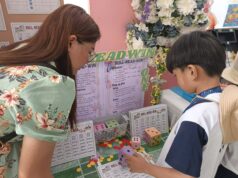NUEVA ECIJA – During wakes for the dead, or in rituals to honor the dead, people who come to commiserate with the members of the bereaved family perform certain activities that will somehow help in easing their sufferings.
The activities are usually done at night up to the wee hours of the morning.
Some play card games, sungka, mahjong, scrabble, tong-its, and other popular games.
Others pray.
There are also several unwritten “don’ts” during the wake for the dead and in burying the dead.
One centuries-old practice during the wake for the dead which is still alive in some towns in Nueva Ecija and Bulacan is the juego de prenda. It is a game involving verbal joust in poetic form by the participating males and females who are generally single.
Oftentimes, this game attracts Tagalog poets in far-away places and is a cause for excitement for many people.
In the gamer, the participants are expected to be adept in coming out with verses on wide-ranging topics that include politics, religion, love, courtship, marriage, culture – anything including the absurd, the obscene, jungle philosophies, the comical or what have you.
STRICT RULES
But there are strict rules to be followed.
Those who commit errors, those who say things that are offensive to the sensibilities or those who forget their lines are fined or asked to “pawn” any of his/her valuables.
In juego de prenda, there is a hari (king), an enselador (moderator), bilyakos (male participants), and bilyakas (female participants). The participants are seated by the side of a long table facing each other with the hari at the head table.
The enselador has a palmatorya (a whip) which symbolizes his power to impose fines or punishments.
The game starts with the har telling everybody about his bird that flew away and perched on one of the participants. The participants are given names or assigned numbers.
Usually the males are assigned numbers only from one to as many as those participating. The females usually select flowers as their names like Sampaguita, Rosal, Kamya, Kampupot, Dama de Noche, or even Kantutay whatever that flower is.
The hari calls out a name in which he believes his bird perched which is readily denied and names another participants in which the bird likely went. And the game goes on.
In case a lady-participant commits a mistake, the enselador imposes a fine or punishment.
INTENSE DEFENSE
But before the fine or punishment is imposed, some bilyakos come to the succor of the lady by defending her thru verses with penetrating arguments, philosophies, sayings and other profound thoughts.
A bilyako who has a deep affection to a bilyaka can make known his feelings thru a verse. He addresses his feelings toward his lady love:
“Kumusta ka, Rosal, ang luhog ko’t daing? “ (The man asks her about her answer to his still unrequited love).
The bilyaka must be good in answering the bilyako also thru verses. Like this one:
“Di ko nilalahat mga lalake ngayon/ Ang kahalintulad ay puno ng kahoy/Nais nang pasanin, di pa napuputol.” (Which could mean that some more sacrifices or rendering more services to the family of his lady love must be done.)
Or her answer may be like this:
“Nang dumating ka’y lagas na ang tangkay/Buko ma’y wala na’t nasa ibang kamay”.
(She said she already gave her “yes” to somebody a long time ago.)
Some bilyakos recite verses which are obscene for which they are given punishment which could either be a song or recitation of a poem. Others recite verses that can eleicit laughter. This can also merit punishment which also includes reciting prayers for the dead or performing some acts.
Before the game is adjourned, a closing dalit or song for the dead is recited or sung.
SOME RITUALS, BELIEFS
During the wake for the dead and in burying the dead, several rituals and beliefs are followed religiously in many places in Nueva Ecija and some other provinces.
Among these are:
* While the body is lying in state, nobody should clean the house with the use of brooms. The filth must be picked up by the bare hands.
* No family member of the dead should bathe while the body still lies in state. Using a wet towel in cleaning the body may be allowed.
* Family members of the dead should not eat bitter gourd (ampalaya) and sour fruits or they will have measles or small lumps on their bodies.
* The arms of the dead should be straight and parallel to the body and the fists not closed. It is also a practice to place a coin in the hands of a dying person. Before burial, it should be retrieved. Whoever keeps the coin will be successful in his/her endeavors, especially those pertaining to business.
* A rosary should be placed inside the coffin, but it should not have broken beads or thread so no problem would bother the surviving family members.
*No burial should take place on a Monday because it is the first day of the week. There may be bad luck the rest of the week for family members of the dead. Neither should the burial take place on a Tuesday or Friday, the witches’ days.
* Before the actual burial, young children of the dead should be carried across the top of the coffin to and fro.
* No tear drop should fall on any part of the body of the dead. A tear means that his/her death is not yet accepted, and he/she will have difficulty entering his/her last destination.
* Pregnant women should not join the funeral processions because they would suffer an abortion or difficulties in childbirth.
Some other practices say that as the coffin is carried out of the house, all windows must be closed. Then, a widow should drop or break the earthen cooking pot placed under the bier during the wake.
Shutting windows is done so that “bad spirits” will not enter the house of the dead person. Breaking the pot drives away another misfortune in the house.
Why it is a widow, not any other person woman, should break the pot is not clearly known.
After the entombment, those who join the funeral procession must return to the house of the dead to get a sprinkling of water. The water is from a basin-full of the liquid mixed with gin and with four 25-centavo coins in it.
“Wala namang mawawala kung susundin ang mga paniniwala at ritwal. Hayaan na lang natin. Baka nga magkatotoo kung hindi sundin ay sisihin pa tayo ng maraming tao (Nothing is lost if you follow these beliefs and rituals. Let’s leave them be. In case they come true if we ignore them, we might be blamed),” said one of those who believe about the rituals and beliefs.
The activities are usually done at night up to the wee hours of the morning.
Some play card games, sungka, mahjong, scrabble, tong-its, and other popular games.
Others pray.
There are also several unwritten “don’ts” during the wake for the dead and in burying the dead.
One centuries-old practice during the wake for the dead which is still alive in some towns in Nueva Ecija and Bulacan is the juego de prenda. It is a game involving verbal joust in poetic form by the participating males and females who are generally single.
Oftentimes, this game attracts Tagalog poets in far-away places and is a cause for excitement for many people.
In the gamer, the participants are expected to be adept in coming out with verses on wide-ranging topics that include politics, religion, love, courtship, marriage, culture – anything including the absurd, the obscene, jungle philosophies, the comical or what have you.
STRICT RULES
But there are strict rules to be followed.
Those who commit errors, those who say things that are offensive to the sensibilities or those who forget their lines are fined or asked to “pawn” any of his/her valuables.
In juego de prenda, there is a hari (king), an enselador (moderator), bilyakos (male participants), and bilyakas (female participants). The participants are seated by the side of a long table facing each other with the hari at the head table.
The enselador has a palmatorya (a whip) which symbolizes his power to impose fines or punishments.
The game starts with the har telling everybody about his bird that flew away and perched on one of the participants. The participants are given names or assigned numbers.
Usually the males are assigned numbers only from one to as many as those participating. The females usually select flowers as their names like Sampaguita, Rosal, Kamya, Kampupot, Dama de Noche, or even Kantutay whatever that flower is.
The hari calls out a name in which he believes his bird perched which is readily denied and names another participants in which the bird likely went. And the game goes on.
In case a lady-participant commits a mistake, the enselador imposes a fine or punishment.
INTENSE DEFENSE
But before the fine or punishment is imposed, some bilyakos come to the succor of the lady by defending her thru verses with penetrating arguments, philosophies, sayings and other profound thoughts.
A bilyako who has a deep affection to a bilyaka can make known his feelings thru a verse. He addresses his feelings toward his lady love:
“Kumusta ka, Rosal, ang luhog ko’t daing? “ (The man asks her about her answer to his still unrequited love).
The bilyaka must be good in answering the bilyako also thru verses. Like this one:
“Di ko nilalahat mga lalake ngayon/ Ang kahalintulad ay puno ng kahoy/Nais nang pasanin, di pa napuputol.” (Which could mean that some more sacrifices or rendering more services to the family of his lady love must be done.)
Or her answer may be like this:
“Nang dumating ka’y lagas na ang tangkay/Buko ma’y wala na’t nasa ibang kamay”.
(She said she already gave her “yes” to somebody a long time ago.)
Some bilyakos recite verses which are obscene for which they are given punishment which could either be a song or recitation of a poem. Others recite verses that can eleicit laughter. This can also merit punishment which also includes reciting prayers for the dead or performing some acts.
Before the game is adjourned, a closing dalit or song for the dead is recited or sung.
SOME RITUALS, BELIEFS
During the wake for the dead and in burying the dead, several rituals and beliefs are followed religiously in many places in Nueva Ecija and some other provinces.
Among these are:
* While the body is lying in state, nobody should clean the house with the use of brooms. The filth must be picked up by the bare hands.
* No family member of the dead should bathe while the body still lies in state. Using a wet towel in cleaning the body may be allowed.
* Family members of the dead should not eat bitter gourd (ampalaya) and sour fruits or they will have measles or small lumps on their bodies.
* The arms of the dead should be straight and parallel to the body and the fists not closed. It is also a practice to place a coin in the hands of a dying person. Before burial, it should be retrieved. Whoever keeps the coin will be successful in his/her endeavors, especially those pertaining to business.
* A rosary should be placed inside the coffin, but it should not have broken beads or thread so no problem would bother the surviving family members.
*No burial should take place on a Monday because it is the first day of the week. There may be bad luck the rest of the week for family members of the dead. Neither should the burial take place on a Tuesday or Friday, the witches’ days.
* Before the actual burial, young children of the dead should be carried across the top of the coffin to and fro.
* No tear drop should fall on any part of the body of the dead. A tear means that his/her death is not yet accepted, and he/she will have difficulty entering his/her last destination.
* Pregnant women should not join the funeral processions because they would suffer an abortion or difficulties in childbirth.
Some other practices say that as the coffin is carried out of the house, all windows must be closed. Then, a widow should drop or break the earthen cooking pot placed under the bier during the wake.
Shutting windows is done so that “bad spirits” will not enter the house of the dead person. Breaking the pot drives away another misfortune in the house.
Why it is a widow, not any other person woman, should break the pot is not clearly known.
After the entombment, those who join the funeral procession must return to the house of the dead to get a sprinkling of water. The water is from a basin-full of the liquid mixed with gin and with four 25-centavo coins in it.
“Wala namang mawawala kung susundin ang mga paniniwala at ritwal. Hayaan na lang natin. Baka nga magkatotoo kung hindi sundin ay sisihin pa tayo ng maraming tao (Nothing is lost if you follow these beliefs and rituals. Let’s leave them be. In case they come true if we ignore them, we might be blamed),” said one of those who believe about the rituals and beliefs.




